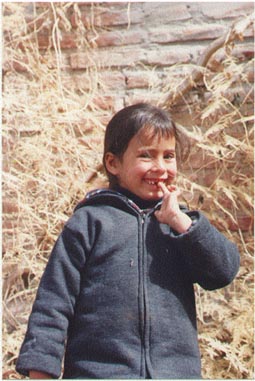Waldorf
Education and �El Trigal� of Argentina
Asociaci�n Comunidad Educativa El Trigal
5885 Villa de las Rosas, Provincia de C�rdoba, Argentina
Tel.: (03544)494556,
www.eltrigal.org
5885 Villa de las Rosas, Provincia de C�rdoba, Argentina
Tel.: (03544)494556, www.eltrigal.org

The first Waldorf School was founded in 1919 in Stuttgart, Germany, as a school for the workers of the �Waldorf Astoria� cigarette factory. The company�s director asked Rudolf Steiner (1861-1925) to act as Educational Director and provide the didactical methodology for the school. Dr. Steiner personally selected all the teachers and gave intensive courses over a period of weeks concerning the educational principles to be applied. The school began with 12 grades and was thus the first �complete school�, with no essential difference between primary and secondary levels. The Waldorf movement spread throughout Germany and other countries, but was banned in Germany when the Nazis came to power.
After the Second World War, already in 1945, the Free Waldorf School re-opened and there was soon a proliferation of such schools worldwide. There are six such schools in Argentina. The obstacles for founding more schools were the lack of money and of teachers trained in the method. A Teacher Training Institute exists since 1989 in Buenos Aires to alleviate the latter deficiency.
II ORGANIZATIONAL PRINCIPLES
Waldorf schools are non-profit-making institutions. The College of Teachers and a School Board administer the school � the pedagogical part being an exclusive function of the College of Teachers. The teacher elected Principal (Headmaster) occupies this function pro forma in order to satisfy legal requirements. The College of Teachers meets weekly to deal with pedagogical and administrative subjects. This implies an additional work burden, which the teachers, being highly motivated, willingly accept. In the countries where there are no state subsidies (the majority), the schools are financed exclusively by parents� contributions and other donations.
III. SOME PEDAGOGICAL PRINCIPLES
The most important factor in education is the relationship teacher-pupil. In Waldorf schools the teachers remain with their group of pupils from the first grade through the end of primary school. In this way an intimate relationship develops between the teacher and the pupils and the teacher comes to know each child as though it were a member of her own family. She accompanies the children in their development and also has the opportunity to develop herself. The teacher, by being less specialized, is more universal.
The school day starts with the �main class�, from 8 to 10 in the morning, during with the intellectual formation subjects are taught (mathematics, history, geography, literature, etc.). The rest of the day is dedicated to other artistic activities: painting, modeling, gardening, physical education, foreign languages, music, etc., taught by more specialized teachers.
The main subjects are taught in �blocks�, that is, periods of 3 to 5 weeks for each subject. Instead of teaching math from 8 to 9, history from 9 to 10, and so on, the main class is dedicated to one subject for those three to five weeks, then another subject for a similar period. In this way, the pupils are able to obtain a deeper understanding of each subject instead of jumping from one to the other in a process of dispersion.
During the early years, the concentration is on psycho-spiritual development instead of informational cramming. For example, the children are taught to read in the second grade, in the first grade they learn to write artistically. In Spanish speaking countries, a beautiful drawing of the sun (sol) is later transformed into the letter �O�, a wave (ola) into �L� and so on, accompanied by stories that illustrate these elements. Afterwards the step to reading is easy because the children can already write. Furthermore, they are more mature. The concept behind not pushing early development is that children can be compared to young plants, delicate in their infancy and needful of loving care against the world�s harsher elements. This early care gives them the strength they need to meet the �real� world when they are older. Experience has shown this idea to be correct. The children rapidly acquire knowledge and they do so with joy.
One or two foreign languages are taught from the first grade on, taking advantage of the child�s natural aptitude for imitation. The main objective is to provide an instrument to amplify the child�s vision of the world while allowing him to understand other cultures.
Art is not merely included as another subject. Rather it constitutes the teacher�s main tool for all her or his teaching method. After all, education is � or should be � an art.
It is not possible in this limited space to enter into more detail on all the aspects of Waldorf didactic methodology, but from what has been mentioned above, it can be seen that the objective is true education and not mere instruction
IV. THE SCHOOL IN SOCIETY
An important principle of Waldorf education is that educational institutions should be free of political state intervention. The state�s legitimate function is to guarantee the rights of citizens, which includes the right to an education, but this doesn�t mean that the state should educate or control schools. Nowadays, when we recognized that the state is inept at controlling industry, we continue thinking that it should retain responsibility for education, which is more important, for without education there would be no industry or economic enterprise of any kind.